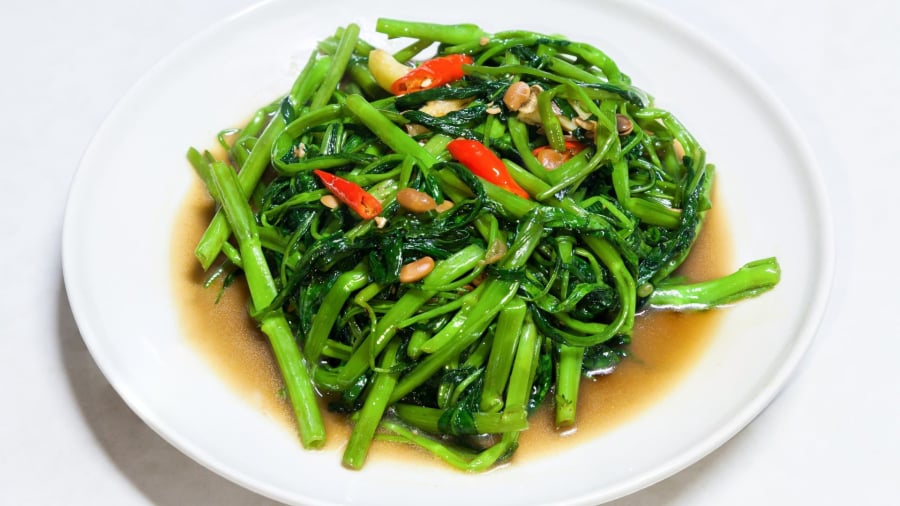Nutritional Value of Water Spinach
Water spinach, a familiar vegetable in Vietnamese cuisine, is not just a humble folk food but also offers surprising health benefits. With its low price, ease of cultivation, and versatility in cooking, water spinach is likened to “commoner’s ginseng,” and some even claim it has superior benefits compared to expensive delicacies such as bird’s nest or ginseng. In this article, we will explore the nutritional values and health benefits of water spinach, justifying why this vegetable deserves to be celebrated in our daily diet.
Water spinach is an excellent source of essential vitamins and minerals for our bodies. According to nutritional research, 100g of water spinach contains approximately 90% water, 3g of protein, 4g of carbohydrates, and an array of vital micronutrients such as vitamins A and C, iron, calcium, and potassium. Notably, the fiber content in water spinach aids digestion, prevents constipation, and maintains gut health.

Vitamin A in water spinach plays a crucial role in protecting eyesight, boosting immunity, and maintaining healthy skin. Vitamin C, a potent antioxidant, helps the body neutralize free radicals, slows down aging, and enhances iron absorption. Iron and calcium support blood formation, prevent anemia, and strengthen bones and joints. Compared to ginseng or bird’s nest, water spinach offers a more diverse range of micronutrients, making it suitable for people of all ages and health conditions.
Cardiovascular Support
One of the standout benefits of water spinach is its ability to protect cardiovascular health. The high potassium content in water spinach helps regulate blood pressure, reduces stress on blood vessel walls, and prevents stroke risks. Additionally, the fiber in water spinach lowers bad cholesterol (LDL) levels in the blood, thereby minimizing the chances of atherosclerosis.
Studies indicate that a diet rich in green vegetables, especially water spinach, can significantly lower the risk of cardiovascular diseases. Compared to bird’s nest, which primarily provides protein and certain amino acids, water spinach has a more comprehensive effect on maintaining a healthy circulatory system due to the combination of potassium, fiber, and antioxidants it offers.
Digestive Benefits
Water spinach is a close companion of the digestive system. The abundant fiber in water spinach stimulates intestinal peristalsis, aids digestion, and prevents constipation. Fiber also acts as a natural “broom,” helping to cleanse the intestines, remove toxins, and reduce the risk of gastrointestinal diseases.

Additionally, water spinach contains a small amount of natural mucilage, which protects the stomach lining and reduces the risk of ulcers. Compared to ginseng, which primarily focuses on energy enhancement and memory improvement, water spinach provides more practical benefits for digestion, especially for those with busy lifestyles and irregular eating habits.
Skin Beautification and Anti-Aging
Water spinach is not just good for your health; it’s also a natural beauty secret for many. The vitamin C content in water spinach boosts collagen production, resulting in supple and elastic skin. Simultaneously, the antioxidants in water spinach protect the skin from UV damage and environmental pollution, slowing down the aging process.
Furthermore, water spinach contains beta-carotene, a precursor of vitamin A, which improves skin pigmentation, reduces dark spots, and promotes healthy, glowing skin. Compared to bird’s nest, renowned for its skin-nourishing properties, water spinach is no less impressive due to its diverse nutritional value and ability to provide essential micronutrients to the body.
Weight Loss and Blood Sugar Control
For those pursuing weight loss or blood sugar control, water spinach is an ideal choice. With a low-calorie count (approximately 20 kcal/100g) and abundant fiber, water spinach induces a feeling of fullness and reduces appetite. This is particularly useful in maintaining a stable body weight.
Moreover, the fiber in water spinach slows down sugar absorption, thereby stabilizing blood sugar levels. Studies show that a diet rich in green vegetables like water spinach can reduce the risk of type 2 diabetes. Unlike ginseng, which does not directly influence weight management, water spinach has a clear advantage in supporting a healthy lifestyle.
Precautions when Consuming Water Spinach
While water spinach offers numerous benefits, consumers should be mindful of a few considerations to ensure safety. Water spinach should be thoroughly washed and properly cooked to eliminate bacteria or parasites. Individuals with a history of kidney stones should limit their consumption of raw water spinach due to its oxalate content, which can increase the risk of stone formation. Additionally, it is advisable to source water spinach from reputable suppliers to avoid vegetables grown in polluted areas.
Water spinach is not just a familiar dish but also a nutritional treasure with exceptional health benefits. From supporting cardiovascular health, improving digestion, enhancing beauty, to aiding weight management, water spinach deserves to be celebrated as a superfood in our daily diet. Compared to ginseng or bird’s nest, water spinach is not only more accessible but also offers comprehensive benefits suitable for all Vietnamese families. Include water spinach in your meals to reap the wonderful advantages it brings!
































